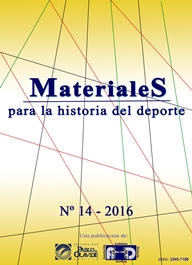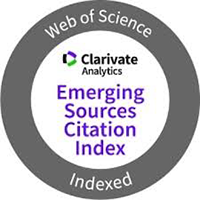Genesis of paralympic games, a mankind’s epic against setbacks
Keywords:
Paralympic Games, motorboats physical limitations, special educational necessities.Abstract
The work seeks to point out the emergence of the Paralympic Games, a competitive event of great magnitude that is carried out every four years when the Olympic Games of Summer finish. The main methods and techniques that were used, document revision, logic-historic method, and triangulation In this research the first steps given in Cuba are taken into account, for the creation of the institutions that take charge of the attention to people with motorboats physical limitations or special educational necessities (term used at the present time). Later on, reference is made to the genesis of these sport competitions to international level, keeping in mind the logical historical analysis that allows to describe the event of the most distant thing in the time and its progressive evolution, it facilitates to give to know the reiterated intents or administrations carried out by Carl Diem, Wall Witz, Dr. Ludwing Guttmann and other to organize these agonales parties of the muscle in non conventional athletes.
Downloads
References
Comité, O. I., Manual de Administración Deportiva. Lausana: McAra, 1999,
González, Alfredo. Historia de la Actividad Física: Apuntes Para la Asignatura. La Habana: Escuela Internacional de Educación Física y Deporte, 2003.
González, Quiñones Y., “Historia del movimiento deportivo de los atletas discapacitados visuales en la provincia de Villa Clara”. (Tesis de grado, Universidad de Ciencia de
la Cultura Física y el Deporte Villa Clara, 2003).
Iglesias, Rodríguez D., “Historia del movimiento deportivo de discapacitados en los municipios de Quemado de Güines y Sagua la Grande”. (Tesis de grado, Universidad de Ciencia de la Cultura Física y el Deporte Villa Clara, 2001).
Masjuan, Sánchez M. y Toraya Carlos. Personalidades del Deporte Cubano. La Habana: Editorial Científico-Técnica. 2007.
Pérez, Ordoñez D., “Acciones para el perfeccionamiento de la técnica en la disciplina de los 100 metros planos del velocista invidente de la provincia de Villa Clara”. (Tesis
de grado, Universidad de Ciencia de la Cultura Física y el Deporte Villa Clara, 2005.
Prieto, Alemán Aurelio y Milton Díaz “X Juegos Paralímpicos: El triunfo del espíritu humano”. Juventud Rebelde, 29 /8/1996. Consultado el 10 de febrero de 2009.
Quiza, Reinaldo. “Inauguran Juegos Paralímpicos”. Juventud Rebelde 17 de agosto de 1996 (Ciudad de la Habana). 927:7, 2000.
Reyes, F. J. C. “Gustavo Francisco Ariosa Menéndez, Gloria Paralímpica del Atletismo en Villa Clara”. (Tesis de grado, Universidad de Ciencia de la Cultura Física y el Deporte Villa Clara, 2008.
Soto, H. V. “Historia de algo más que una hazaña”. Trabajadores, 5/9/1996. Consultado el 10 de febrero de 2009.
Valle, Álvarez R., “Formación Ambiental de los profesionales vinculados a la preparación de los atletas discapacitados de Levantamiento de Pesas”. (Tesis de grado, Universidad de Ciencia de la Cultura Física y el Deporte Villa Clara, 2006.
Javier Velásquez, “X Juegos Paralímpicos: Sencillamente Gigantes”, Bohemia, 15 de septiembre de 1996, 28.
Wong, C. “X Juegos Paralímpicos: Un triunfo del coraje y la voluntad”. Granma, 30/8/1996. Consultado 10 de febrero de 2009.
Downloads
Published
Issue
Section
License
Authors who submit to this journal agree to the following terms:
- Author(s) keep copyright and guarantee to the journal the right to be the first publication of the work as licensed under Creative Commons Attribution-Noncommercial-ShareAlike 4.0 International as initial publication in this journal.
- Author(s) can establish additional agreements for non-exclusive distribution of the version of the work published in the journal (for example, to an institutional archives or to publish it in a book), with an acknowledgment of its initial publication in this journal.
- It is allowed and authors are encouraged to disseminate their work electronically (e.g, in institutional open archives or on their own website) before and during the submission process, as it can lead to productive exchanges, as well as a citation earlier and more of published work (See the Effect of Open Access).










